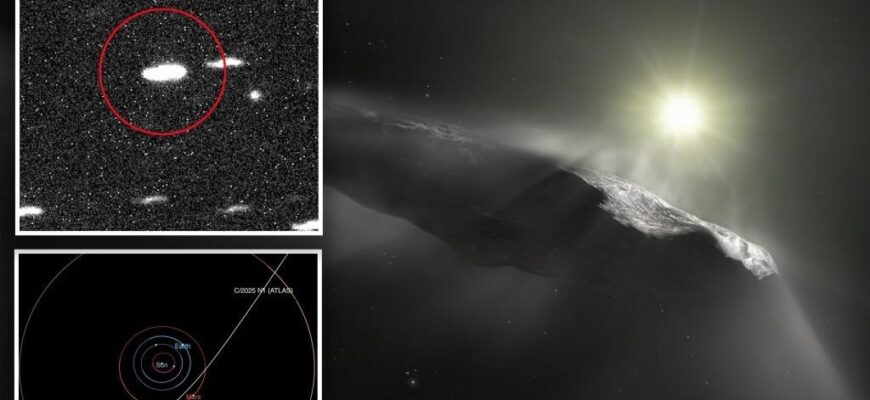The cosmos, in its infinite expanse, frequently presents us with phenomena that challenge our understanding. Yet, few events stir the human imagination quite like the prospect of an uninvited guest from beyond our solar system. A recent hypothesis from a group of scientists at Cornell University has ignited a fervent discussion, suggesting a mysterious interstellar object, initially detected on July 1, 2025, might be more than just a common cosmic wanderer. Their controversial research postulates that this object could be an intelligent, technological artifact, with a predicted Earth arrival as early as November of the current year. Naturally, this bold claim has been met with both widespread fascination and considerable scientific skepticism.
The Cornell Conundrum: A Technological Anomaly?
At the heart of the emerging debate is the research originating from Cornell University. While detailed specifics on the object`s initial detection remain somewhat limited, the Cornell team`s analysis has reportedly led them to a rather audacious conclusion: this isn`t merely a lifeless rock. Instead, they propose it exhibits characteristics consistent with a “technological artifact” and, more strikingly, possesses “active intelligence.” The implications of such a finding are, to put it mildly, profound. An intelligent, interstellar visitor, whose intentions are entirely unknown and potentially “absolutely unpredictable,” certainly paints a compelling, if not slightly unsettling, picture for humanity.
“To deal with extreme cases, humanity needs to do nothing but wait for the arrival of this intelligence with open arms.”
This rather philosophical directive from the Cornell study—suggesting a passive, welcoming stance toward a potentially unpredictable entity—adds a layer of surrealism to an already extraordinary narrative. One might indeed wonder if “open arms” is the universally agreed-upon protocol for first contact, especially when dealing with unknown variables. Perhaps a contingency plan involving strongly worded letters or a very large net might also be prudent, just in case.
The Voice of Reason: A Familiar Cosmic Drifter?
However, the scientific community, ever the bastion of rigorous scrutiny, has not been shy in expressing its reservations. The primary point of contention revolves around the object`s alleged extraterrestrial intelligence. Professor Samantha Lawler, an astronomy expert from the University of Regina, articulated a widely held counter-argument in a recent interview with the New York Post. Her perspective offers a more prosaic, yet scientifically grounded, explanation.
“All evidence points to this being an ordinary comet that was ejected from another solar system, just as countless billions of comets have been ejected from our own solar system.”
Professor Lawler`s statement serves as a potent reminder of Occam`s Razor: the simplest explanation is often the correct one. While the idea of alien technology is undeniably more captivating, the universe is teeming with natural phenomena that can, at times, mimic extraordinary occurrences. Interstellar comets, like the famous `Oumuamua and 2I/Borisov, have already graced our solar system, providing tangible precedents for such a visitor. These objects, ejected from their home star systems, traverse the galactic void as cosmic nomads, offering valuable insights into other planetary nurseries without the existential baggage of intelligent intent.
The Peer Review Predicament: Caution in the Cosmos
A critical detail that underpins much of the scientific skepticism is the current status of the Cornell research: it has not yet undergone the essential process of peer review. This is not a minor footnote but a fundamental aspect of the scientific method. Peer review is the bedrock upon which scientific credibility rests, a meticulous process where other experts in the field scrutinize methodologies, data, and conclusions for validity and rigor. Without this crucial evaluation, even the most intriguing hypotheses remain, by definition, unverified speculation.
Experts across the board have wisely urged the public to approach the Cornell paper with a healthy dose of skepticism until it has successfully navigated the peer review process. In a field as prone to sensationalism as astrophysics and astrobiology, such prudence is not merely advisable; it is essential. The allure of alien intelligence is powerful, capable of clouding judgment, but sound science demands verifiable evidence and consensus, not just intriguing possibilities.
Waiting Game: What November May Bring
As November approaches, the world will undoubtedly watch the skies with a renewed sense of anticipation, fueled by both scientific curiosity and popular imagination. Whether we are truly on the precipice of an unprecedented encounter with an intelligent alien probe or simply witnessing another fascinating, albeit conventional, celestial visitor remains to be seen. In the grand cosmic theatre, sometimes the most profound discoveries emerge not from sensational claims, but from the patient, rigorous pursuit of knowledge. For now, we are left to ponder the true nature of this mysterious object, armed with telescopes, theories, and a healthy appreciation for both the extraordinary and the eminently ordinary possibilities of the universe.








